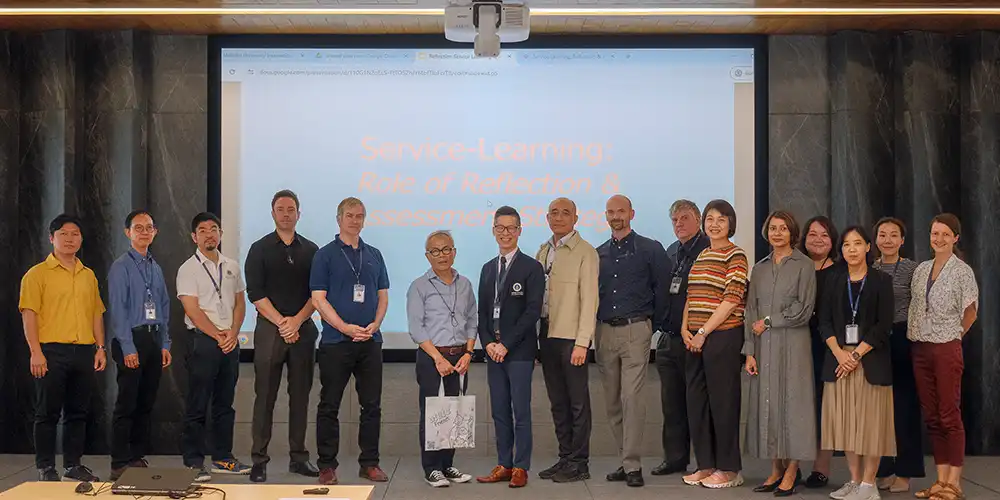Understanding MUPSF: A Quality Assessment Approach to Teaching and Learning
November 4, 0202 2023-08-07 4:00Understanding MUPSF: A Quality Assessment Approach to Teaching and Learning

Understanding MUPSF: A Quality Assessment Approach to Teaching and Learning
Title: Understanding MUPSF: A Quality Assessment Approach to Teaching and Learning
Date & Time: Friday, 4 November 2022 from 1:30 – 2:30 p.m.
Venue: A201, Aditayathorn building
Conductor: Mr. Chanon Sriburapapirom, Acting Director of the Division of Education Administration
The Strategy and Academic Development Section under the OAA organized a workshop entitled ‘Understanding MUPSF: A Quality Assessment Approach to Teaching and Learning.’ This workshop aimed at introducing and preparing faculty members for the new teaching quality assessment called Mahidol University Professional Standards Framework (MUPSF).
As Mahidol University aims at enhancing the learning and teaching experience for the students and lecturers, Mahidol University Professional Standards Framework or MUPSF is developed. The purpose is to help drive culture change and meet defined competencies, skills and attributes that demonstrate Innovative Pedagogy and contribute to Mahidol University Strategic Plan for 2018 – 2037. One part of the MU strategic plan is Innovative Education and Authentic Learning to increase the percentage of lecturers achieving Level 2: Teaching for a specific group of MUPSF. This framework was adopted from the United Kingdom Professional Standards Framework (UKPSF) and adjusted to meet the Mahidol University context. Thus, the MU Announcement on MUPSF mentioned that if the tenured teacher has been certified with UKPSF, he/she is also considered qualified for MUPSF. There are a number of levels and they vary as follows:
- UKPSF: Associate Fellow is considered qualified for Level 1 of MUPSF
- UKPSF: Fellow is considered qualified for Level 2 of MUPSF
- UKPSF: Senior Fellow is considered qualified for Level 3 of MUPSF
- UKPSF: Principal Fellow is considered qualified for Level 4 of MUPSF
For MUPSF, the professional standards are divided into the following 4 levels:
- Level 1: Fundamental Teaching (15 qualifications)
- Level 2: Teaching for a specific group (13 qualifications)
- Level 3: Cross-disciplinary teaching (2 qualifications)
- Level 4: Educational policy leader (1 qualification)
Each level respectively has its qualifications that the instructor must possess. To achieve Level 1, an instructor must achieve 15 qualifications, while Level 2 requires additional 13 qualifications. As for Level 3, 2 additional qualifications are added, and another 1 qualification is required to achieve Level 4. In total, 31 qualifications are required to achieve Level 4 of MUPSF. Apart from the difference in the number of qualifications involved, each qualification also has different criteria and assessment methods. Each level has a set of clear guidelines for the preparation of evidence submitted for the teaching quality assessment. The aim is to promote the teaching quality of higher education teachers set by the Bureau of Higher Education Standards and Evaluation, Office of the Higher Education Commission.At the heart of this standard is a commitment to acknowledge the accountability MU holds to all stakeholders and demonstrate the professionalism that the staff brings to teaching, students’ development as well as overall programs. The standard will not only help fulfill the expectations of teachers’ increasing levels of knowledge, practices, and professional engagement, but also helps direct the way the programs, policies, procedures, and systems are established, executed, and accredited. The guidelines as well as all information related to MUPSF has been made available to all participants via the MUIC web page or contact the Academic Strategy Unit at # 4327: https://muic.mahidol.ac.th/eng/academic-resources/keep-teaching-learning/keep-teaching/assess-teaching%ef%bf%bc/











